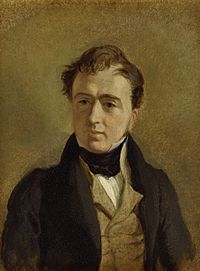Francis Baring, 1st Baron Northbrook facts for kids
Quick facts for kids
The Lord Northbrook
|
|
|---|---|
 |
|
| Chancellor of the Exchequer | |
| In office 26 August 1839 – 30 August 1841 |
|
| Monarch | Victoria |
| Prime Minister | The Viscount Melbourne |
| Preceded by | Thomas Spring Rice |
| Succeeded by | Henry Goulburn |
| First Lord of the Admiralty | |
| In office 1849 – 28 February 1852 |
|
| Preceded by | The Earl of Auckland |
| Succeeded by | The Duke of Northumberland |
| Financial Secretary to the Treasury | |
| In office 6 June 1834 – 14 November 1834 |
|
| Preceded by | Thomas Spring Rice |
| Succeeded by | Vacant |
| In office 21 April 1835 – 26 August 1839 |
|
| Preceded by | Sir Thomas Fremantle |
| Succeeded by | Robert Gordon |
| Personal details | |
| Born | 20 April 1796 Calcutta, India |
| Died | 6 September 1866 (aged 70) Micheldever, Hampshire |
| Nationality | British |
| Political party | |
| Spouses |
|
| Alma mater | Christ Church, Oxford |
Francis Thornhill Baring (born April 20, 1796 – died September 6, 1866) was an important British politician. He was also known as Sir Francis Baring before he became the 1st Baron Northbrook. He belonged to the Whig Party, which was a major political group in Britain at the time. He worked in the governments led by Lord Melbourne and Lord John Russell.
Early Life and Education
Francis Baring came from the famous Baring banking family. He was the oldest son of Sir Thomas Baring, 2nd Baronet, and his mother was Mary Ursula Sealy.
He went to school at Winchester College and then Eton College. He studied at Christ Church, Oxford, and achieved excellent results, earning a "double first class" in 1817. This meant he got the highest possible grades in two different subjects. Four years later, he earned his Master of Arts degree. In 1823, he became a lawyer, which is called being "called to the Bar" at Lincoln's Inn. In 1848, he took over his father's title as a baronet.
Political Career Highlights
Baring started his political journey in 1826 when he became a Member of Parliament (MP) for Portsmouth. He held this position until he retired in 1865. A year after his retirement, he was given the title of Baron Northbrook, which made him a member of the Peerage of the United Kingdom.
- Lord of the Treasury: In 1830, Baring was appointed a Lord of the Treasury. This role involved helping to manage the government's money. He held this job for four years.
- Secretary to the Treasury: He also served as a Secretary to the Treasury from 1834 to 1839 (with a short break). This role meant he was a key helper in managing the country's finances.
- Chancellor of the Exchequer: In 1839, Baring became the Chancellor of the Exchequer. This is a very important job, like being the country's main finance minister. He was also sworn into the Privy Council, a group of advisors to the monarch. He served as Chancellor until the government changed in 1841.
- First Lord of the Admiralty: In 1849, he returned to the government as the First Lord of the Admiralty. This role put him in charge of the Royal Navy, Britain's powerful fleet of ships. He held this position until 1852.
Baring was also a member of the Canterbury Association. This group helped plan and set up the settlement of Canterbury in New Zealand. He even donated £600 to support education in the new settlement.
Family Life
Lord Northbrook was married twice during his life.
His first marriage was on April 7, 1825, to Jane Grey (1804–1838). She was the daughter of Sir George Grey, 1st Baronet. They had two children:
- Hon. Mary Baring (died 1906), who married John Bonham-Carter.
- Thomas George Baring (1826–1904), who later became the Earl of Northbrook.
His second marriage was in 1841 to Lady Arabella Georgina Howard (1809–1884). She was the daughter of Kenneth Howard, 1st Earl of Effingham. They had one son:
- Hon. Francis Henry Baring (1850–1915).
Lord Northbrook passed away on September 6, 1866, when he was 70 years old. His son, Thomas, from his first marriage, inherited his title. Lady Northbrook died in December 1884.
Honours and Legacy
A place in the Canadian Arctic, Baring Bay on western Devon Island, is named after Francis Baring to honor him.
 | Dorothy Vaughan |
 | Charles Henry Turner |
 | Hildrus Poindexter |
 | Henry Cecil McBay |

